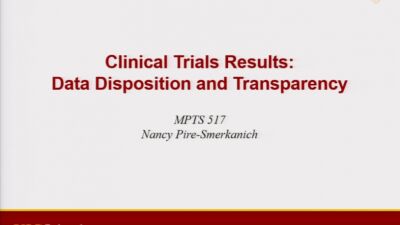Clinical trials results: data disposition and transparency
- Data disposition--where does all the data go?
- Newspapers/headlines
- Press releases
- Clinical study report (CSR)
- Abstracts/manuscripts
- Registries such as www.clinicialtrials.gov
- Submitting reports to regulatory authorities around the world such as IND, NDA/MAA
- Develop press release
- Good - positive results and action plan and gain founding
- Bad - negative results and individuals may stop using those medicines
- Two audiences ie. investors, lawyers, other businesses, search engines
- Author clinical study report
- A standard available for producing a report: ICH E3- structure and content of clinical study
- De facto standard
- Most transferable
- Globally accepted and easy to use
- Flexible for phase I studies
- CSRs consists of the following:
- Protocol element
- Patients disposition
- Data disposition
- Statistics output
- Publications
- Abstracts
- Manuscripts not critical in industry and they will develop marketing materials later on
- Sharing results with sites/subjects
- Press release
- Tell those who are in the study how it went so no one is unaware
- We do not have a good process for this, but putting into clinicaltrials.gov might assist with this objective
- Sites are responsible to tell the subjects what the results are
- Submitting reports to regulatory authorities
- US IND
- National health authority of other countries (if required)
- As part of marketing application (NDA/MAA)
- When do we submit study results/reports?
- During development
- Of an investigational new drug or clinical trial application (IND or CTA)
- To support other clinical investigations
- With IND annual reports
- Informational amendments
- Fulfill post-marking agreements- PMR/PMC
- Of an investigational new drug or clinical trial application (IND or CTA)
- During development
- Data repositories
- Exist all around the world
- Government sponsored
- Clinicaltrials.gov
- Transparency initiative
- Basic uses - identify trials of potential interest for specific individual, track process of specific trial, identify ongoing and terminated/completed trials, identify investigators/research members for certain studies
- National Institute of Health clinical data repository (NIH CDR)
- Includes all clinical electronic data from 1975 to present
- Updated daily and publicly funded
- Clinicaltrials.gov
- Industry/company sponsored (new)
- Mandatory reporting
- Voluntary participation
- Principle for responsible clinical trial data sharing
- Includes data from approved and non-approved drugs
- Public-private partnership
- Database for the aggregate analysis of ClinicalTrials.gov (AACT)
- Issue: No idea where the data is aggregated from, questioning the quality of the data
- Industry/company sponsored
- PhRMA and EfPIA
- Biopharma companies are committed to enhancing public health through responsible sharing, yet also not violating the patient privacy, integrity of regulatory systems, and maintaining incentives for investment in biomedical research
- Look for trends to lobby around
- Clinical trial data sharing is relatively new
- Must vet investigators etc.
- Background in the US
- Suppression of research results led to safety issues and prevent innovation
- Reasons to register clinical trials and report results
- Human subject protections
- Research integrity
- Evidence based medicine
- Allocation of resources
- History of ClinicalTrials.gov
- FDAMA 113 (1997): mandates registry
- Launched site in Feb. 2000
- FDAAA 801(2007): expands registry and adds results database
- Still requires phases II-IV drug and device trials for all diseases
- Requires result reporting (2008)
- Basic results, expansion of results, FDA-approved trials
- Added enforcement provisions
- Clinicialtrials.gov
- Report summary trials at trial completion for
- Trials of devices
- Small feasibility studies are exempt
- Trials of drugs and biologics
- Phase I investigations are exempt
- Trials of devices
- Report summary trials at trial completion for
- Trial reporting:
- Register study before first participant is enrolled
- Keep entries up to date
- Subject to FDAAA
- Basic results reporting requirements
- Submission within 12 months of the earlier of estimated/actual primary completion date
- Can postpone results due to marketing but will have to post them eventually
- Uses of ClinicalTrials.gov
- Audience: volunteers, finding a new drug, finding a center of research for a given condition/intervention
